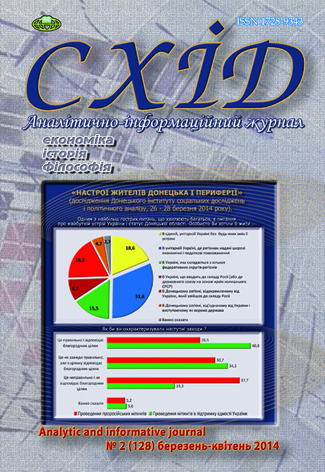Avgustin's version of universalize the concept of peace as a principle of harmonization immanent and transcendental
DOI:
https://doi.org/10.21847/1728-9343.2014.2(128).24806Keywords:
universal, world, immanent, transcendentAbstract
The article deals with the concept of peace in the Holy imagined. Augustine - the value of this concept for a positive solution to the problem of synchronization of collective and individual and maintaining communication between the immanent and transcendent. It is concluded that the concept of peace in Augustine's Christian doctrine was universal meaning through its complexity and cumulativeness towards approaching the ordo amoris and salvation - a practical movement immanent to the transcendent, and vice versa. Father of the Church interpreted peace like a multilayer condition of united harmony - unanimity individual and collective. Due to individual achievement of peace at all levels of social, political and religious life pax aeterna pax sempiterna and most are near and so bring humanity to God's grace. The point spread peace was both individual and collective responsibility, religious and moral virtues of true believers - all Respublica Christiana. Guide this case should lead the Church, which is part of the sacred nature is in pax aeterna, and so brings pax sempiterna to His plan. So peace in Avgustin's theory provides harmony and positive movement immanent to the transcendent, synchronizes broken individual sinfulness of collective harmony and provides a certain level of freedom that aims at implementing free will. No doubt Augustinian concept of peace has played in the Middle Ages and early modern key role in the development of humanity and the formation of European principles of coexistence of peoples and nations. Avgustin's doctrine of peace through practical pax Dei (they promoted the Church in the tenth to thirteenth centuries. Pacification for feudal wars and legitimized royal authority), the creative heritage of Dante and Marsyliya Padua became the foundation of modern political philosophy and the key to the future of European civilization.
References
Гьофе О. Розум і право. Складові інтеркультурного правового дискурсу / Отфрід Гьофе ; [пер. з нім. Л. А. Ситниченко, М. Д. Култаєвої]. - К. : Альтерпрес, 2003. - 264 с.
Гьофе О. Демократія в епоху глобалізації / Отфрід Гьофе. - К. : ППС-2002, 2007. - 436 с.
Маєр Г. Августин / Ганс Маєр ; [пер. з нім.] // Класики політичної думки від Платона до Макса Вебера. - К. : Тандем, 2002. - С. 73-101.
Августин Блаженный. О граде Божием / Блаженный Августин. - Мн. : Харвест, М. : АСТ, 2000. - 1296 с.
Вільз Г. Зручна держава / Гарі Вільз // КОНСЕРВАТИЗМ: Антологія. - 2-ге вид. / [упоряд. О. Проценко, В. Лісовий]. - К. : ВД "Простір", "Смолоскип", 2008. - С. 694-716.
Августин Блаженный. Энхиридион, или О вере, надежде и любви / Августин Блаженный. - К. : "УЦИММ-ПРЕСС" - "ИСА", 1996. - 413 с.
Нисбет Р. Прогресс: история идеи / Роберт Нисбет ; [пер. с англ. под ред. Ю. Кузнецова, Гр. Сапова]. - М. : ИРИСЭН, 2007. - 557 с.
REFERENCES
Hofe A. (2003), Reason and judgment. The components of intercultural legal discourse, Alterpress, Kyiv, 264 p. (ukr).
Hofe A. (2007), Democracy in the age of globalization, Kyiv, 436 p. (ukr).
Mayer H. (2002), Augustine, in Classics political thought from Plato to Max Weber, Tandem, Kyiv, pp. 73-101 (ukr).
S. Aurelii Augustine (2000), O city of God, Moscow, 1296 p. (rus).
Vilz G. (2008), Convenient state, CONSERVATISM, Anthology. 2nd ed.; Kyiv, pp. 694-716 (ukr).
S. Aurelii Augustine (1996), Enhiridion, or about faith, hope and love, Kyiv, 413 p. (rus).
Nisbet R. (2007), Progress: History of the Idea, Moscow, 557 p. (rus).
Downloads
Published
How to Cite
Issue
Section
License
Copyright (c) 2014 Oleh Turenko

This work is licensed under a Creative Commons Attribution-NonCommercial-NoDerivatives 4.0 International License.
1. Authors bear responsibility for the accuracy of facts, quotations, numbers and names used.
2. Manuscripts are not sent back.
3. The publisher does not always agree with the authors' opinion.
4. The authors reserve the right to authorship of the work and pass the first publication right of this work to the journal under the terms of a Creative Commons Attribution Non-Commercial License, which allows others to freely distribute the published research with the obligatory reference to the authors of the original work and the first publication of the work in this journal.
5. The authors have the right to conclude separate supplement agreements that relate to non-exclusive work distribution in the form in which it has been published by the journal (for example, to upload the work to the online storage of the journal or publish it as part of a monograph), provided that the reference to the first publication of the work in this journal is included.

